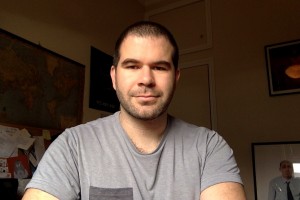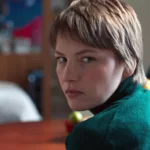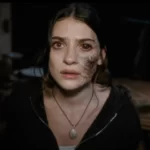In a matter of hours the BIGSOUND conference and live event will be underway. Speakers from all over the world will descend on Brisbane, while bands, from here and further afield, will showcase their wares. The man in the hot seat this year is Nick O’Byrne. Nick is the programmer for the event, taking over from Graham “Asho” Ashton. Sean Sennett caught up with Nick earlier in the week.
TOM: Congrats on the BIGSOUND line-up this year. It’s impressive. What was your first time you attended or became involved in BIGSOUND?
Nick: I attended when I was an intern at AIR, which is the Australian Independent Record Label Association, which then later became a job which I ended up running for five years. I’ve been every year since I first attended, probably back in 2007.
TOM: You’re a veteran. What were the early highlights for you, when you were going as a punter at BIGSOUND?
Nick: The first year I went I very clearly remember Jonathan Poneman being the keynote speaker. He was one of the founders of Sub Pop in Seattle, which obviously had a huge impact on the worldwide industry at the end of the ’80s and early ’90s, for bringing grunge to the world. He’s a legend. I’ve known about him and I’ve known the history of Sub Pop so it was quite kick to kind of see him and meet him. I also remember very clearly that year there was a standout breakout act at BIGSOUND was Temper Trap, before they’d gone overseas, before their debut album.
TOM: How did you come to land the job as the programmer?
Nick: I guess they have a rotational policy, which I think is pretty healthy. Every few years they move you on. Through my work at AIR, I had the luck to travel around the world quite a lot, to various music events and talk shop a lot. You develop your own opinions on the good and bad aspects of the industry, and which parts you’d change, and stuff. BIGSOUND always seemed like the place where you discuss all that. So yeah, when it came time for them to look for the next person I put my hand up and put everything I could into an application.
I had a prior connection with QMusic, a lot of those musical organisations have to work together on issues of copyright or Australian content or anything like that. It’s a small enough industry that I wasn’t out of the blue for them. They knew me before they started working with me.
TOM: What were you thinking when you sort of had your hat on as programmer? Could you give an overview of what you’re trying to bring to the program?
Nick: That’s a good question. I guess one of the things I really feel strongly about — I guess one of the things I’ve observed in the past few years is that Australian artists and those working with them are exporting really well. That’s the whole reason BIGSOUND exists, but I think I went even harder to bring as many influential agents, festivals, labels into the country as possible.
The idea being that if we can create a kind of marketplace in Brisbane where Australia’s best up and coming artists are all playing, then it becomes this sort of focal point for the international music industry to engage with Australian music. I want BIGSOUND to be seen as this place of discovery where the Pitchfork magazines of the world, and the NMEs of the world, and the Coachella and SxSW and all them, where they need to come to Brisbane every year to make sure they’re aware of what’s going on in Australia. That’s the kind of overarching idea behind it, which I guess has always been their aim at BIGSOUND. I just have the ability I think, the freedom to bring in a few more internationals this year.
If you look at the panels and discussions, there’s just a few genres in Australia that are sort of at a crossroads. In particular country music and hip hop are both at a point in their development in this country where some amazing decisions and amazing things could be happening or not. It just feels like there’s this moment, like Australian hip hop is a mature genre now, selling millions of records and tickets. And it’s starting to diversify musically and culturally which has probably been its biggest criticism over the years, or the biggest criticism of the genre, to have a panel discussion about the future of hip hop with the calibre of speakers that we have there, all the leaders — not all the leaders, but many of the leaders in Australian hip hop, which I’m very excited about.
TOM: Who in particular has got you excited from the hip hop world about being here?
Nick: That’s the interesting one, it’s exclusively an Australian panel. You have Jimblah one of the country’s leading indigenous MCs. We have L-FRESH the Lion, who is an incredibly erudite Sikh Indian MC, who actually did the Like A Version spot on Triple J this morning. It was really good. But he’s coming from such a different angle. It’s amazing that you can call someone like him — I mean he is from Western Sydney, he’s an Australian rapper but he’s sort of representing something a bit more of a multicultural Australia. And I think that’s amazing. That’s reflected in the programming as well.That was one of the focuses.
Then aside from that, there’s one panel I’m really excited about, about fans, where we actually put the word out today on Facebook and got a ridiculous response, so many people. (We) basically asked if anyone considers themselves obsessed with music, would they like to speak on a panel at BIGSOUND. The one rule was they’re not allowed to be involved in the music industry.
The idea behind it, I guess it’s really easy for the music industry to get its head stuck up its own ass sometimes, and it’s like this self-regenerating industry where you’re patting yourselves on the back all the time. But in the end, the most important thing is the engagement between a musician and their fan. We stress models and streaming and stuff like that, I was just interested to know if a fan even cares about that. One of the only things I ever think about is stuff like that, but does a fan care how they get their music? What is the most important thing about a band? Hopefully if we get a bunch of open and interested fans, they can provide the industry some insight. I guess it’s an experiment, that one. We’ll see if that one works.
TOM: Just to ask you about your process, once you came up with your view of where you’d like the conference to go, was it a case of jumping on a plane, hitting the phones? How did you manage to draw all this incredible talent together and get them all on one program?
Nick: I guess when it comes to overseas, BIGSOUND’s at a point where it’s been around long enough that it’s started to build quite a reputation. I was lucky enough to inherit something that already had a lot of momentum behind it. When Australians are overseas, I know they’re saying they’re exporting very well. Every event, every festival, when you go there, you speak to these people, agents or record labels. They’re like ‘oh wow, Australia is going really well’. ‘Love to come over there some time’. Quite often the response from people aside from me is you should speak to BIGSOUND. Maybe they’ll come out.
A lot of the Australian industry help do that and everyone’s got their own contacts, and they all know the focal point of bringing the industry into Australia is BIGSOUND. I guess I’ve been travelling to conferences for a while and ever since I suppose I’ve been an artist manager I travelled a lot with my artists.
TOM: Who do you manage these days?
Nick: I manage an artist called Courtney Barnett. She’s had an amazing couple of years, and so it’s given me an excuse to be international. I think it’s a weird one because in some ways I think it helps the [programming] if you’re very heavily engaged in day-to-day business in the industry. Like my predecessor, Asho, he’s a manager and has a label and all that kind of stuff.
TOM: How do you go about choosing the bands to play BIGSOUND live? Is there a criteria the bands have to meet when they apply for the gig?
Nick: I guess there’s not an official criteria. The criteria I have, rough criteria is you have to be in a position in your career, whether you’re just starting out or quite established, where you’re about to take a big step forward. And BIGSOUND might be part of that.
For example, if you’re about to release an album, and that requires you to hopefully travel around North America and play a bunch of shows, and you want to be playing for agents and festivals that could book you for those shows, if you can justify that, then you’re a candidate of being selected. If you know what I mean. It doesn’t matter what genre you are.
One of the big things, aside from hip hop and country, this year we’ve got two stages dedicated to metal. There’s no way I am going to know every single genre. I ask a lot of people what their feelings are about certain bands.
You just try to piece together a good, balanced line up. In the end there’s this dual thing, you want to sell tickets that people will come and watch, the public, but at the same time the aims are far broader than just selling tickets. They’re not necessarily always going to be the biggest band.
TOM: Do you see BIGSOUND as having to serve Queensland first, or serve Australia first?
Nick: I see it as a Queensland event, and as an event serves Queensland. But I wouldn’t say it necessarily serves Queenslanders. It’s a great event for Queensland and I try to make sure they’re represented across all states, but there’s no policy at all about where everyone has to be from. I pay a lot of attention, especially when they’re Queenslanders, because it is a Queensland event.
When I started the process, based in Melbourne, the first thing the board said to me was I had to read Pig City – it’s a really well researched and beautifully written history of rock and roll in Brisbane from the kind of late ’70s through to now, around about the year 2000, which is amazing. It’s a great book and it actually gives incredible insight into a city and the history that it’s had musically. I guess the event is meant to serve Queensland, but it’s also very deliberately try to be a national event.
The board understands that the only way for an event to survive, there’s been a lot of attempts to do a long-running festival, or showcase festival in Australia in every state around the country. But the board understands that the strength of the event lies in the fact that it isn’t just Queenslanders now that have a stake in it… New South Wales, WA, South Australia, everyone needs BIGSOUND or understands they can use BIGSOUND to be really beneficial for their business and music.
You’ll find everything you need to know about this year’s BIGSOUND here http://www.qmusic.com.au/bigsound/2014/




